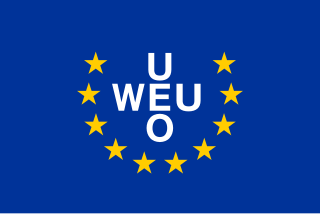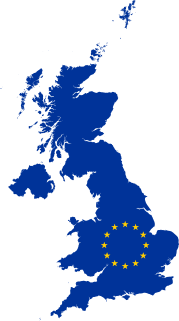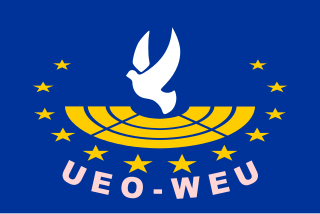
The Western European Union was the international organisation and military alliance that succeeded the Western Union (WU) after the 1954 amendment of the 1948 Treaty of Brussels. The WEU implemented the Modified Brussels Treaty. During the Cold War, the Western Bloc included the WEU member states and the United States and Canada as part of the North Atlantic Treaty Organization (NATO).

The derivatives market is the financial market for derivatives, financial instruments like futures contracts or options, which are derived from other forms of assets.

The ABC Trial was a United Kingdom trial conducted in the 1970s, of three men for offences under section 2 and of one of these men, a scholarly journalist, for the offence under section 1 of the Official Secrets Act 1911. The men were two libertarian journalists of a similar political viewpoint as much of the Labour government, and a resigned GCHQ source seeking to heighten scrutiny of government-authorised wire-tapping and limit the work of the American agency, the CIA, in Britain. These aims were furthered in the following two decades achieved through detailed parliamentary scrutiny into and regular reports as to the work of security services, a Freedom of Information Committee and regulation of wire-tapping. Aside from very limited reportage from the Central Criminal Court, its early analysis comes in the account of one of its investigative-journalist defendants, Duncan Campbell, in the annual journal The Socialist Register.

The European Union Agency for Law Enforcement Cooperation, better known under the name Europol, formerly the European Police Office and Europol Drugs Unit, is the law enforcement agency of the European Union (EU) formed in 1998 to handle criminal intelligence and combat serious international organised crime and terrorism through cooperation between competent authorities of EU member states. The Agency has no executive powers, and its officials are not entitled to arrest suspects or act without prior approval from competent authorities in the member states. Seated in The Hague, it had 1,432 staff members in 2022.

VEST ciphers are a set of families of general-purpose hardware-dedicated ciphers that support single pass authenticated encryption and can operate as collision-resistant hash functions designed by Sean O'Neil, Benjamin Gittins and Howard Landman. VEST cannot be implemented efficiently in software.

A referendum on the Maastricht Treaty was held in Denmark on 2 June 1992. It was rejected by 50.7% of voters with a turnout of 83.1%. The rejection was a blow to the process of European integration, although the process continued. The result of the referendum, along with the "petit oui" in the French Maastricht referendum signaled the end of the "permissive consensus" on European integration which had existed in most of continental Europe until then. This was expressed by Pascal Lamy, chef de cabinet for Jacques Delors, the president of the European Commission, who remarked that, "Europe was built in a Saint-Simonian [i.e., technocratic] way from the beginning, this was Monnet's approach: The people weren't ready to agree to integration, so you had to get on without telling them too much about what was happening. Now Saint-Simonianism is finished. It can’t work when you have to face democratic opinion." From this point forward issues relating to European integration were subject to much greater scrutiny across much of Europe, and overt euroscepticism gained prominence. Only France, Denmark and Ireland held referendums on Maastricht ratification.

The European Union Committee is a select committee of the House of Lords in the Parliament of the United Kingdom. Its terms of reference are "To consider European Union documents and other matters relating to the European Union", as well as "to represent the House as appropriate in interparliamentary co-operation within the European Union".

The Assembly of the Western European Union, also called the European Security and Defence Assembly, was a parliamentary assembly for delegations from the national parliaments of the member countries of the Western European Union (WEU), a security and defence organisation. Its final session was on 10 May 2011.

European Union Force Chad and the Central African Republic, also EUFOR Tchad/RCA after the French, was the European Union mission in Chad and the Central African Republic (CAR), authorised in late 2007. EUFOR Chad/CAR was authorised under the same United Nations Security Council resolution that mandated MINURCAT, a UN force tasked with training police and improving judicial infrastructure.
The core of the security and intelligence system of the Republic of Croatia consists of two security and intelligence agencies:

The European External Action Service (EEAS) is the diplomatic service and combined foreign and defence ministry of the European Union (EU). The EEAS is led by the High Representative for Foreign Affairs and Security Policy (HR/VP), who is also President of the Foreign Affairs Council and vice-president of the European Commission, and carries out the EU's Common Foreign and Security Policy (CFSP), including the Common Security and Defence Policy (CSDP).
The EU Intelligence and Situation Centre is a "civilian intelligence function" of the European Union (EU). Structurally, it is a directorate of the External Action Service (EEAS) and reports directly to the EU's High Representative for Foreign Affairs and Security Policy. Article 4 of the Treaty on European Union, among other things, expressly states that "national security remains the sole responsibility of each Member State". EU INTCEN's analytical products are based on intelligence from the EU Member States' intelligence and security services.

The Lithuanian Special Operations Force (LITHSOF) is a special operation unit of the Lithuanian Armed Forces, formed exclusively of carefully selected, motivated and specially trained professionals. The main tasks of the Special Operations Force are counter terrorism, special reconnaissance, and hostage rescue.

The area of freedom, security and justice (AFSJ) is a collection of justice as well as migration & home affairs policies designed to ensure security, rights and free movement within the European Union (EU). Fields covered include the harmonisation of private international law, extradition arrangements between member states, policies on internal and external border controls, common travel visa, immigration and asylum policies and police and judicial cooperation.

Hizb ut-Tahrir America is a separate, but linked entity to the international pan-Islamist and fundamentalist organization that seeks to establish a global caliphate governed under Shariah law. Under this caliphate, members work toward uniting all Islamic countries as well as transforming secular, host countries into Islamic states. Hizb ut-Tahrir America's goals are the same as the global organization – the installation and implementation of sharia law as the sole source of law.

The EU economic governance, Sixpack describes a set of European legislative measures to reform the Stability and Growth Pact and introduces greater macroeconomic surveillance, in response to the European debt crisis of 2009. These measures were bundled into a "six pack" of regulations, introduced in September 2010 in two versions respectively by the European Commission and a European Council task force. In March 2011, the ECOFIN council reached a preliminary agreement for the content of the Sixpack with the commission, and negotiations for endorsement by the European Parliament then started. Ultimately it entered into force 13 December 2011, after one year of preceding negotiations. The six regulations aim at strengthening the procedures to reduce public deficits and address macroeconomic imbalances.

The Crime and Security Branch (CSB) – previously known as C3 – is responsible for the administration of national security, counter terrorism and serious crime investigations within the Garda Síochána, the national police force of Ireland. The section oversees intelligence relating to subversive, paramilitary and terrorism matters, conducts counter-intelligence, liaises with foreign law enforcement agencies, handles confidential informants, administers VIP and witness protection, monitors potential corrupt Garda officers and provides information on threats to the state to the Garda Commissioner and Government of Ireland.
The East StratCom Task Force (ESCTF) is a part of the European External Action Service, focused on "effective communication" and promotion of European Union activities in Eastern Europe and beyond. The task force's flagship project is EUvsDisinfo, a database of articles and media which the organization considers as providing false, distorted or partial information.

The European Research Group (ERG) is a research support group and caucus of Eurosceptic Conservative Members of Parliament of the United Kingdom. The journalist Sebastian Payne described it in the Financial Times as "the most influential [research group] in recent political history".














